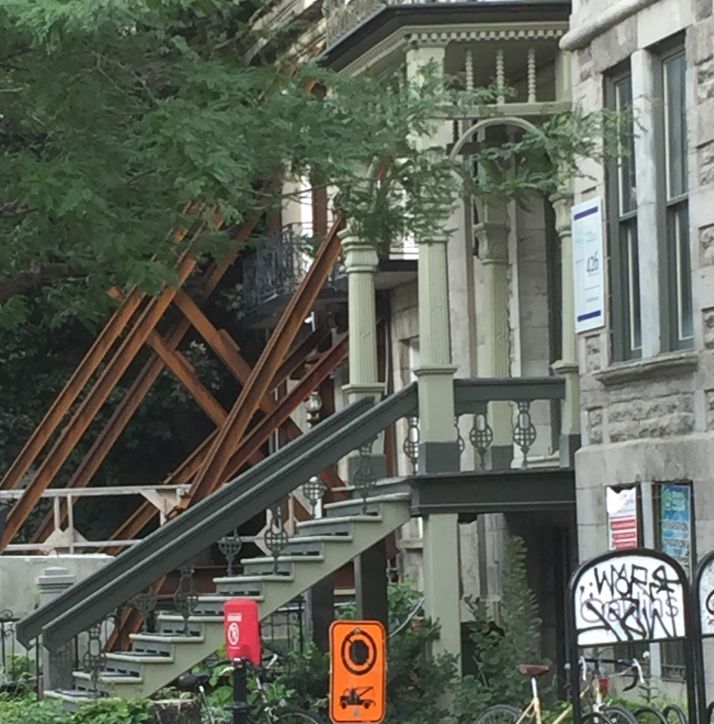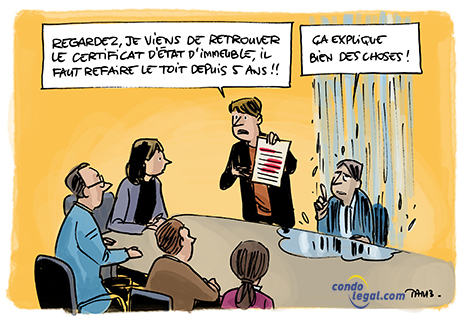 All co-ownerships have common portions that need to be maintained. These may include corridors, stairs, gardens and elevators. The syndicate has an obligation to ensure their maintenance, since the declaration of co-ownership generally provides that it is the main person responsible for them.
All co-ownerships have common portions that need to be maintained. These may include corridors, stairs, gardens and elevators. The syndicate has an obligation to ensure their maintenance, since the declaration of co-ownership generally provides that it is the main person responsible for them.
In addition, article 1039 of the Civil Code of Quebec stipulates that the syndicate has the obligation to ensure the preservation of the immovable and, by the same token, the maintenance of common portions. As for the maintenance of common portions for restricted use, for example balconies, it can be entrusted (in part) to the co-owners who have the enjoyment. This reduces the use of external service providers, thereby reducing the amount allocated to common expenses.
Maintenance of common portions
The syndicate maintains the common portions through the board of directors. This responsibility includes the maintenance of the common spaces and equipment of the building. To ensure this load correctly, he must in particular:
Maintenance of restricted common portions
The duty to maintain the common portions of the syndicate also applies to the common portions for restricted use. The declaration of co-ownership may, however, delegate this charge, in whole or in part, to each of the co-owners who benefit from an exclusive right of enjoyment. The co-owner concerned must therefore keep them clean and functional. This is the case for window washing, maintenance of storage boxes and snow removal of balconies, to name but a few examples. The costs that would result from a lack of maintenance would be borne by the offending co-owner.
Penalties for failure to maintain by the syndicate
In the event of damage caused by the lack of maintenance of a common part, the syndicate could be held liable. Article1077 of the Civil Code of Quebec provides that "the syndicate is liable for damage caused to the co-owners or third persons by faulty design, construction defects or lack of maintenance of the common portions". A lack of maintenance would therefore engage his civil liability. Compensation for the damage could have significant financial consequences for the syndicate's budget.
It is better to take seriously this obligation to maintain the common portions. And for good reason, since the co-owners would not hesitate to claim any amount of money from the syndicate, if the latter caused them harm by its lack of maintenance. The courts have already recognized the existence of moral damage suffered by co-owners,in view of the troubles and inconvenience caused to them bythe syndicate's negligence in this regard.
It is therefore crucial that any syndicate carry out the necessary work, in order to avoid the deterioration of the common portions of the building. Maintenance costs may be significant in some cases, but they will always be lower, compared to compensation for damages for lack of maintenance. However, its obligation towards the co-owners is distinct from that of the seller, in particular at the level of the guarantee against hidden defects (article 1726 and following of the Civil Code of Quebec).
Penalty for failure to maintain a common part for restricted use
The inappropriate behaviour of a co-owner with regard to the maintenance in good condition of the common parts for restricted use may, in certain circumstances, engage his civil liability. On this issue, article 1458 of the Civil Code of Quebec provides as follows:
« Every person has a duty to honour his contractual undertakings.
Where he fails in this duty, he is liable for any bodily, moral or material injury he causes to the other contracting party and is bound to make reparation for the injury; neither he nor the other party may in such a case avoid the rules governing contractual liability by opting for rules that would be more favourable to them. »
This conduct would be characterized as wrongful if it were not reasonably prudent and diligent, in the light of the circumstances observed. The civil liability of a co-owner was also upheld by the Court of Quebec – Small Claims Division in January 2019, for having allowed a large amount of snow (about 5 feet in some places) to accumulate on her balcony. The court ruled that the declaration of co-ownership included an obligation (for all co-owners) to clear snow from their balcony, even if it was a restricted common area.
Obsolescence of the building
The buildings of a co-ownership must be maintained in good condition, in order to ensure the safety and well-being of its occupants. Not only does negligence in the maintenance of common portions have an impact on the civil liability of the syndicate, but it can also undermine the value of the real estate assets. This would lead the building to accelerated die-out.
Several co-ownerships have fallen behind schedule in the maintenance and completion of the work to be done on their building. This situation may, eventually, cost the syndicate and the co-owners concerned dearly. Unless drastic measures are taken to correct the situation.
WHAT YOU SHOULD KNOW ! Article 1064 of the Civil Code of Quebec states that co-owners who use the common portions for restricted use contribute alone to the resulting charges. The courts have ruled on a number of occasions on the interpretation to be given to the term "charge". Thus, it does not include, except as set out in the declaration of co-ownership, the charges associated with the cost relating to the major repair and replacement of the common portions for restricted use.
 WHAT TO KEEP IN MIND : The syndicate's maintenance obligations concern both common and restricted common portions, as the law makes no distinction between the two.
WHAT TO KEEP IN MIND : The syndicate's maintenance obligations concern both common and restricted common portions, as the law makes no distinction between the two.
 WARNING ! In many cases, newly elected directors are completely unaware of the state of their co-ownership, for example with regard to ongoing maintenance plans, work carried out in the past or common portions in need of replacement. By having a contingency fund survey and a maintenance logbook, they will be able to do these follow-ups and have a global vision of the things done and to do in their building.
WARNING ! In many cases, newly elected directors are completely unaware of the state of their co-ownership, for example with regard to ongoing maintenance plans, work carried out in the past or common portions in need of replacement. By having a contingency fund survey and a maintenance logbook, they will be able to do these follow-ups and have a global vision of the things done and to do in their building.



